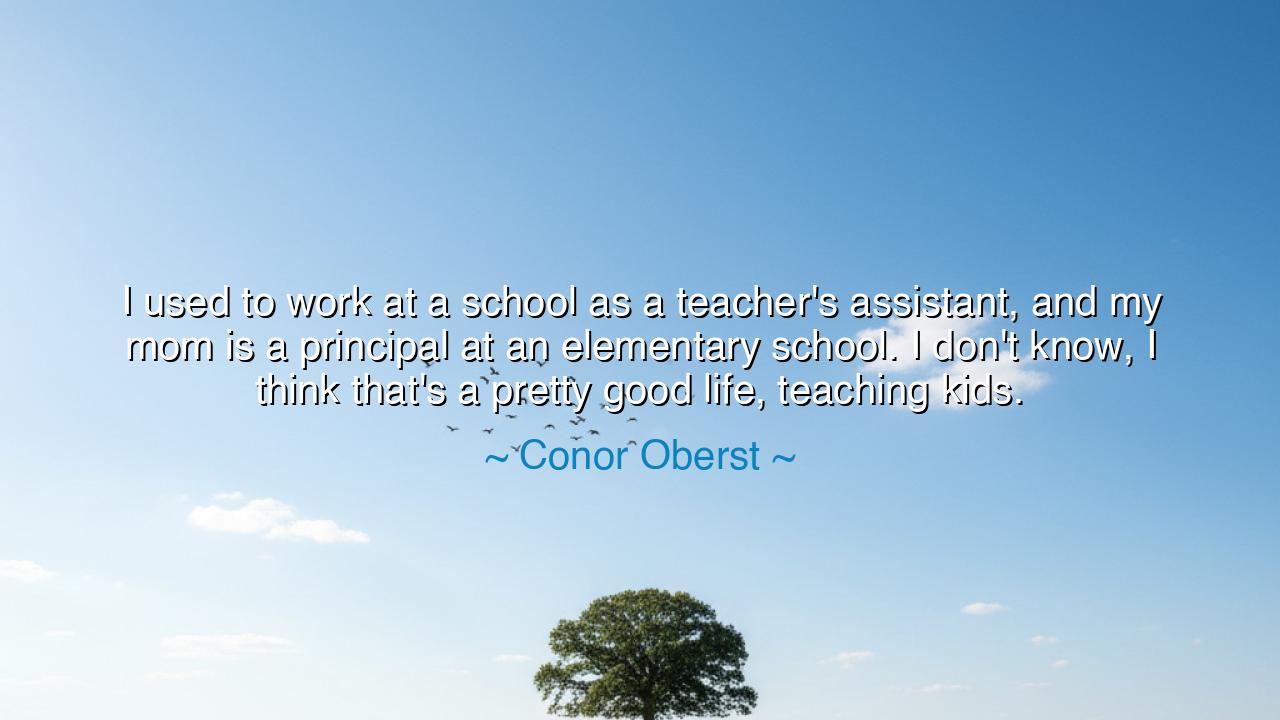
I used to work at a school as a teacher's assistant, and my mom
I used to work at a school as a teacher's assistant, and my mom is a principal at an elementary school. I don't know, I think that's a pretty good life, teaching kids.






Hearken, O seekers of purpose and the quiet nobility of labor, to the words of Conor Oberst, who reflects: “I used to work at a school as a teacher’s assistant, and my mom is a principal at an elementary school. I don’t know, I think that’s a pretty good life, teaching kids.” In these simple words lies a meditation on the virtue of service, the shaping of young minds, and the profound fulfillment found in nurturing the next generation. The ancients revered such lives: those who labor not for riches, but to cultivate knowledge, character, and hope, are the true pillars of society.
Oberst’s reflection reveals the generational thread of teaching, where the vocation passes from parent to child, not merely in occupation but in spirit and purpose. His mother, a principal, guides the institution; he, a teacher’s assistant, tends to the daily growth of young souls. Together, they embody the ancient principle that education is not a solitary endeavor, but a shared enterprise, a covenant between those who teach and those who nurture the learners. Each day in the classroom becomes an act of legacy, care, and moral cultivation.
Consider the essence of his statement: “that’s a pretty good life, teaching kids.” It is a recognition that fulfillment is not measured by wealth, power, or fame, but by the impact one leaves on others. To shape young minds, to inspire curiosity, and to cultivate virtue and understanding, is to participate in the eternal work of civilization itself. The teacher’s life, though often humble and unheralded, carries a resonance that echoes across generations, influencing not only the immediate students but the society they will one day lead.
Historical examples illuminate this truth. Booker T. Washington, born into slavery, became a teacher and founder of Tuskegee Institute, shaping countless young lives through education. His devotion was not merely to knowledge, but to the growth of character and the empowerment of future generations. Like Oberst, he understood that a life devoted to teaching children is a life of profound significance, quietly molding the world in ways that wealth and power alone cannot achieve.
Oberst also underscores the humility and intimacy of this work. The teacher’s assistant does not stand in the spotlight; the labor is daily, patient, and often unseen. Yet it is here, in the small acts of guidance, encouragement, and care, that true transformation occurs. The ancients recognized that the shaping of youth, like the tending of a garden, requires attention, consistency, and love, and that the fruits of such labor may bloom long after the gardener has departed.
The lesson is clear: the nobility of a life dedicated to teaching lies not in recognition, but in service. To educate children is to invest in the future, to instill values, curiosity, and resilience that will ripple outward into society. It is a calling that honors patience, empathy, and dedication, and it is among the most enduring contributions one can offer to the world.
Practical guidance flows from this reflection. Embrace opportunities to teach, mentor, or guide, whether formally in classrooms or informally in daily life. Recognize that even small acts of instruction, encouragement, or modeling can shape hearts and minds. Value the legacy of knowledge and care that flows from generation to generation, and participate actively in nurturing it.
Thus, O seeker, inscribe this wisdom upon your spirit: to live a life of teaching children is a life of profound meaning. Like Oberst and his mother, embrace the quiet dignity of service, the shaping of young souls, and the cultivation of knowledge, virtue, and hope. In this labor, the ordinary becomes sacred, and the humble work of guiding children becomes a cornerstone of civilization, echoing through the lives they touch and the generations yet unborn.






AAdministratorAdministrator
Welcome, honored guests. Please leave a comment, we will respond soon